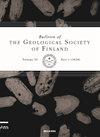A new method for testing thermal shock resistance properties of soapstone – Effects of microstructures and mineralogical variables
IF 1.3
4区 地球科学
Q2 GEOLOGY
引用次数: 7
Abstract
Soapstone industry utilizes different types of soapstone mainly as a construction material for fireplaces. In this application soapstone has to meet different temperature requirements in different parts of fireplaces. Mineralogical and structural information is needed for placing an appropriate type of soapstone in an appropriate position in the fireplace construction. This allows employment of higher temperatures resulting in more particulate-free combustion, which makes it possible for soapstone industry to develop more efficient and environmentally friendly fireplaces. Of many soapstone types, which differ from each other in their chemical composition and thermal properties, carbonate soapstone and its microstructural variations were investigated in this study. A new method was developed to measure thermal shock resistant of natural stones. By exposing carbonate soapstone samples of different textural types to rapid temperature changes, it was possible to determine the parameters that affect the capacity of the rock to resist thermal shock. The results indicate that the type of microtexture is an important factor in controlling the thermal shock resistance of carbonate soapstone. The soapstone samples with a high thermal shock resistance show deformation textures, such as crenulation cleavage and S/C mylonite. A strong negative correlation was observed between the thermal shock resistance and length of cleavage domains in foliated rocks. Also a slight elevation in the iron concentration of talc and magnesite was discovered to improve the thermal shock resistance of carbonate soapstone. Attention should especially be paid to the length and planarity of cleavage domains of spaced foliation.测试皂石抗热震性能的新方法——微观结构和矿物学变量的影响
皂石工业利用不同类型的皂石主要作为壁炉的建筑材料。在这种应用中,肥皂石必须满足壁炉不同部位的不同温度要求。在壁炉结构的适当位置放置适当类型的皂石需要矿物学和结构信息。这允许使用更高的温度,从而产生更多的无颗粒燃烧,这使得皂石行业有可能开发更高效和环保的壁炉。在化学成分和热性能各不相同的多种皂石类型中,本文研究了碳酸盐皂石及其显微结构的变化。提出了一种测定天然石材抗热震性能的新方法。通过将不同结构类型的碳酸盐皂石样品暴露在快速温度变化中,可以确定影响岩石抵抗热冲击能力的参数。结果表明,微织构类型是控制碳酸盐皂石抗热震性能的重要因素。具有较高抗热震性的皂石样品呈现出微裂解理和S/C糜棱岩等变形织构。片理岩的抗热震性与解理域长度呈显著负相关。此外,还发现滑石和菱镁矿中铁浓度的轻微升高可提高碳酸盐皂石的抗热震性。应特别注意间隔叶理的解理域的长度和平面度。
本文章由计算机程序翻译,如有差异,请以英文原文为准。
求助全文
约1分钟内获得全文
求助全文
来源期刊
CiteScore
1.30
自引率
0.00%
发文量
5
审稿时长
>12 weeks
期刊介绍:
Bulletin of the Geological Society of Finland (BGSF) publishes research articles and short communications in all branches of geosciences. Contributions from outside Finland are welcome, provided that they contain material relevant to Finnish geology or are of general interest.

 求助内容:
求助内容: 应助结果提醒方式:
应助结果提醒方式:


